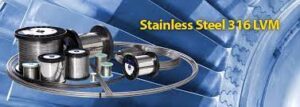The Value of Implant Grade Alloys
More body jewelers have seen the value of using implant grade metals, like ASTM F138 316 LVM Stainless Steel, for products that will be worn in or on the body. These alloys are certified to an ASTM “F” specification, which when applied to metals, signifies that the quality of the alloy is acceptable to be used in a medical application. Some of these “F specs” indicate implant grade, while others indicate surgical instrumentation grade. It is important to make sure that the material used is to the implant grade. These grades go through an additional process called “vacuum melting” (the “VM” in 316L-VM) which not only removes impurities, but in the case of stainless steel, allows for a better surface layer on the material. This layer prevents the leeching of elements, like nickel, into the body. Very important for people with nickel allergies.
“Surgical Steel” refers to a variety of alloys. Some of them are used for body jewelry, but only a few specific grades like ASTM F-138 are proven bio-compatible. The term “surgical steel” often simply means that it is instrument grade–used in scalpels, hypodermic needles, and any other use that involves only temporary contact with the body.
Implant grade alloys cost more then lesser quality material, but it amounts to a fraction of the price of the finished product. Considering the benefits to customer confidence, marketing possibilities, and the image of the jeweler, price isn’t such an issue.
Nickel Sensitivity
The EEC Nickel Directive is a regulation that requires a low rate of nickel release for all materials used for accessories that have direct contact with ones skin. Since allergies to this element are common it is a good idea to invest in a product that is low in nickel, or is proven to not release nickel into the body.
Commercially Pure Titanium is also ideal for people with concerns about nickel sensitivity. CP grade titanium can be anodized to create jewelry of different colors without affecting the safety, and is certified to ASTM F-67. We also carry Ti 6Al4V ELI that is ASTM F-136 compliant as a stronger implant grade material. 6-4 ELI (extra low interstitials) is commonly used in artifical joints and permanent spinal repair.
Ask for Mill Test Reports
VM Medical Alloys is dedicated to the satisfaction of our customers. We only sell material that will last, therefore we recommend investing in material that has implant grade specifications, such as ASTM F138, when purchasing material to put in someone’s body. Insist on mill test reports when you are dealing with someone’s health. This insures that the material you are buying is traceable to the originating mill and is the authentic product you intend on using.
Nickel Directive is a regulation that requires a low rate of nickel release for all materials used for accessories that have direct contact with ones skin. Since allergies to this allow are common it is a good idea to invest in a product that is low in nickel.
Titanium is a metal that is ideal for people with concerns about nickel sensitivity. This material can be anodized to create jewelry of different colors without affecting the safety. We carry implant certified titanium like Ti6Al4V ELI that is ASTM F-136 compliant and commercially pure titanium that is ASTM F-67 compliant.
VM Medical Alloys are dedicated to the satisfaction of our customers. We only sell material that will last, therefore we recommend investing in material that has implant grade specifications such as ASTM F138 certified when purchasing material.






